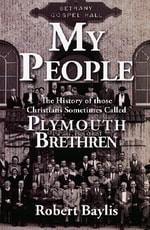
The History of those Christians Sometimes Called Plymouth Brethren. Paperback, 428pp. Published by Gospel Folio Press, 304 Killaly St. West, Port Colborne, Ontario, Canada, L3K 6A6. Price £16.99, ISBN 1-897117-28-0.
The scope of this book is daunting. In four major sections plus four appendices ROBERT BAYLIS sets out to chronicle the growth and progress of the assemblies in North America from 1825 to the present day. The first section is an account of the beginnings of the movement in Britain. The author does not gloss over the sad history of the years from 1848 onwards but, in recounting it, is concerned to focus on the principles behind the actions and to identify some of the lessons which may be learned. The two extremes of emphasis, embodied in the personalities of J. N. Darby and A. N. Groves, and the consequences which led to the Open and Exclusive groupings, are clearly described. The author identifies ten cardinal elements, which he labels ‘First Principles’, that define ‘Brethrenism’ and adds the definition of ‘Brethren’ by PROFESSOR F. F. BRUCE,. These elements include the centrality of the Lord’s Supper, the authority of Scripture, and the imperative of evangelism resulting in missionary endeavour.
A significant section of the book, section two, ‘Pioneering Days in North America’, and section three, ‘The Golden Age of Independent Brethrenism 1920-1960’, will prove rewarding for the determined reader who has a specific interest in these topics. Along the way important lessons are highlighted and serious questions relevant to our day are raised.
The fourth section, ‘The Brethren in the Space Age’, while providing interesting examples of current activities, may be seen by many as a reminder that while we look for better methods, God looks for better men! The example of a modern assembly, ‘A visit to a “New Style” Brethren Church’ left me wondering just how many of those ‘First Principles’ were still in place.
There are some curiosities: J. N. Darby’s gravestone has been moved from Bournemouth to Portsmouth! There is a description of Darby’s view of the Rapture and subsequent events which may prove unrecognizable to many; and some confusion over the date of the re-building of the Tabernacle. More worrying, for me, was the list of lecturers at Regent College, Vancouver which included one whose name is associated with universalism, openness theology, and conditional immortality.
Overall, this is an interesting book which, if read with discernment, could encourage us to examine our history, to learn from past failures and renew our determination to apply changeless New Testament principles to present challenges.
[Our thanks to Ed Hotchin, Hucknall, Nottingham, for this review]
| Cookie | Duration | Description |
|---|---|---|
| cookielawinfo-checkbox-advertisement | 1 year | Set by the GDPR Cookie Consent plugin, this cookie is used to record the user consent for the cookies in the "Advertisement" category . |
| cookielawinfo-checkbox-analytics | 11 months | This cookie is set by GDPR Cookie Consent plugin. The cookie is used to store the user consent for the cookies in the category "Analytics". |
| cookielawinfo-checkbox-functional | 11 months | The cookie is set by GDPR cookie consent to record the user consent for the cookies in the category "Functional". |
| cookielawinfo-checkbox-necessary | 11 months | This cookie is set by GDPR Cookie Consent plugin. The cookies is used to store the user consent for the cookies in the category "Necessary". |
| cookielawinfo-checkbox-others | 11 months | This cookie is set by GDPR Cookie Consent plugin. The cookie is used to store the user consent for the cookies in the category "Other. |
| cookielawinfo-checkbox-performance | 11 months | This cookie is set by GDPR Cookie Consent plugin. The cookie is used to store the user consent for the cookies in the category "Performance". |
| elementor | never | This cookie is used by the website's WordPress theme. It allows the website owner to implement or change the website's content in real-time. |
| viewed_cookie_policy | 11 months | The cookie is set by the GDPR Cookie Consent plugin and is used to store whether or not user has consented to the use of cookies. It does not store any personal data. |